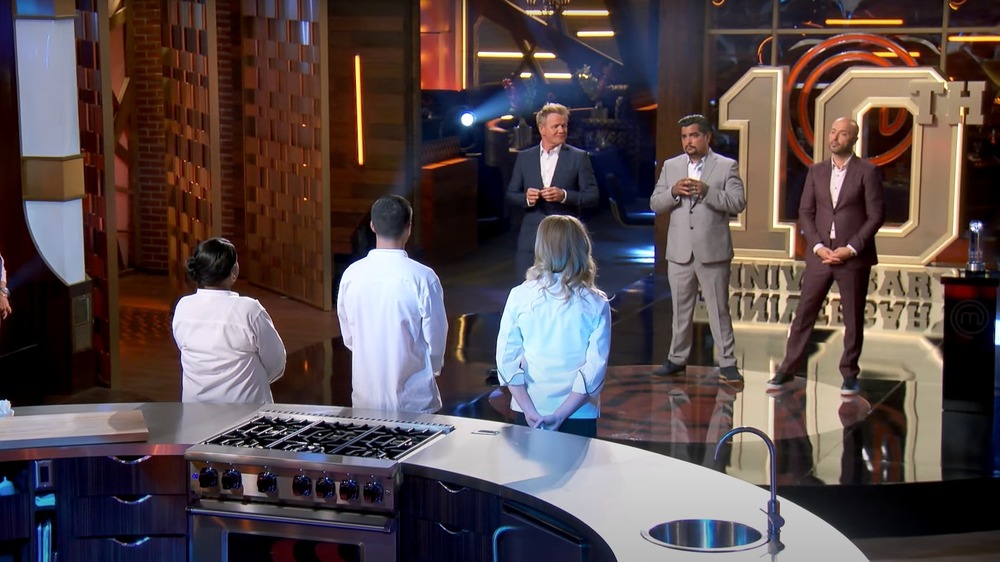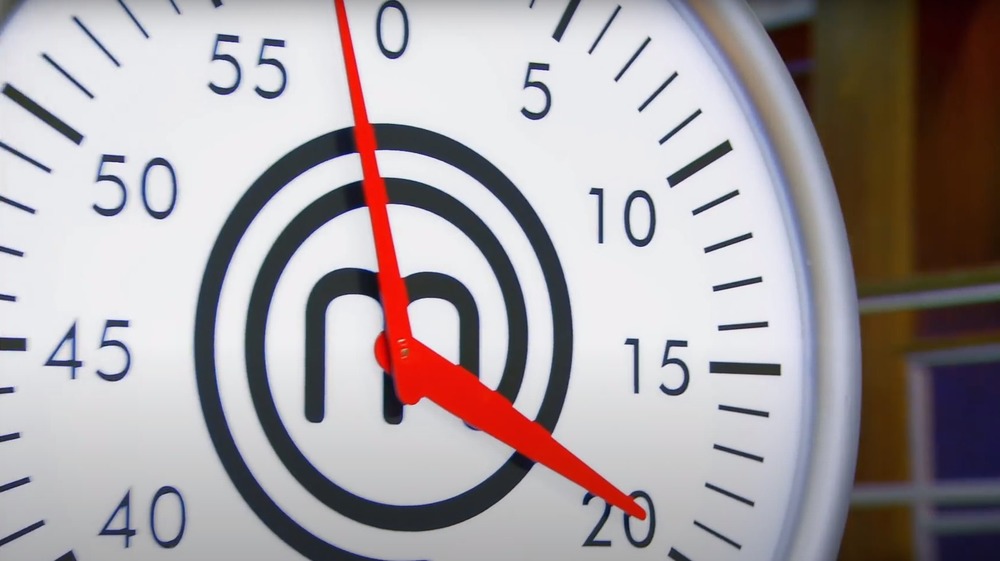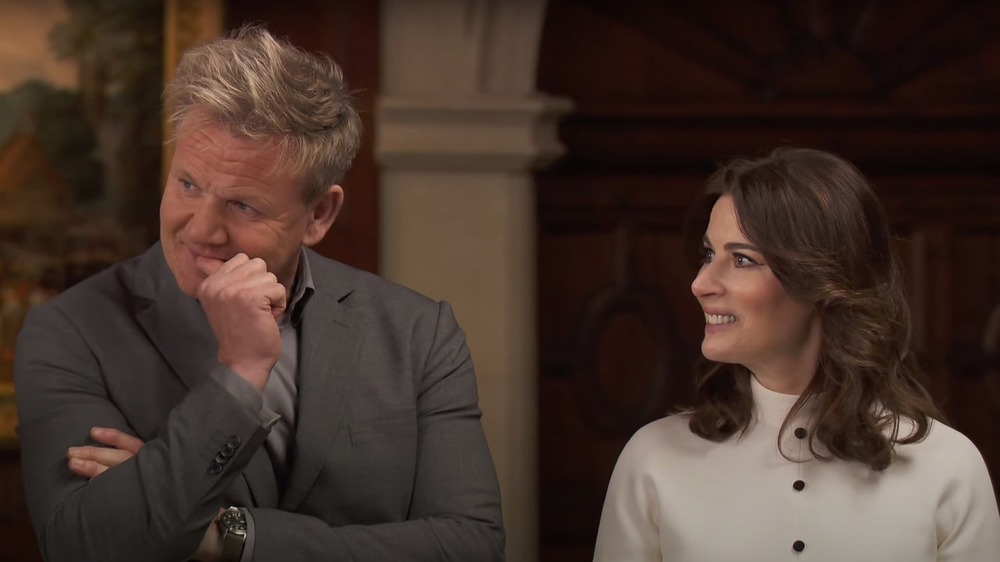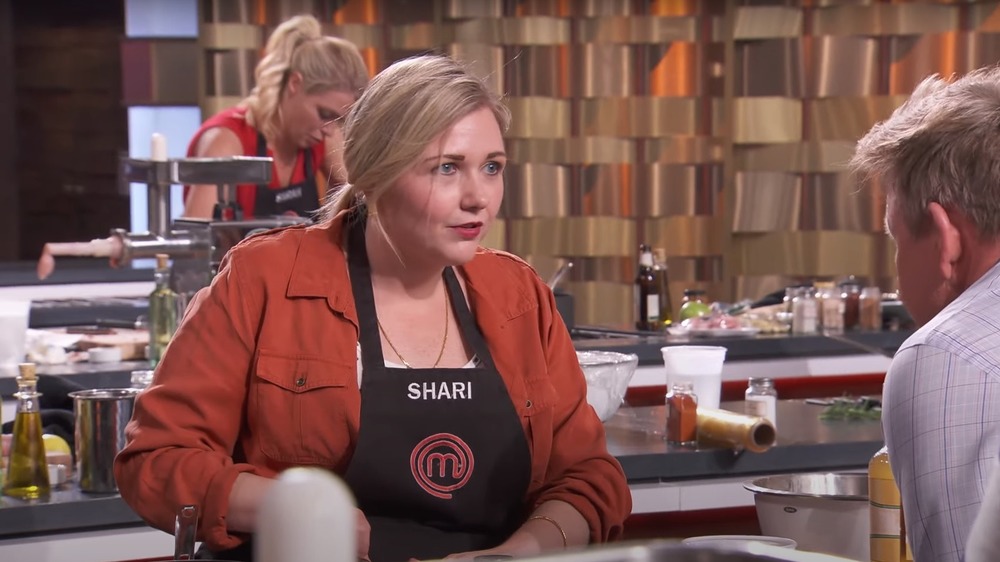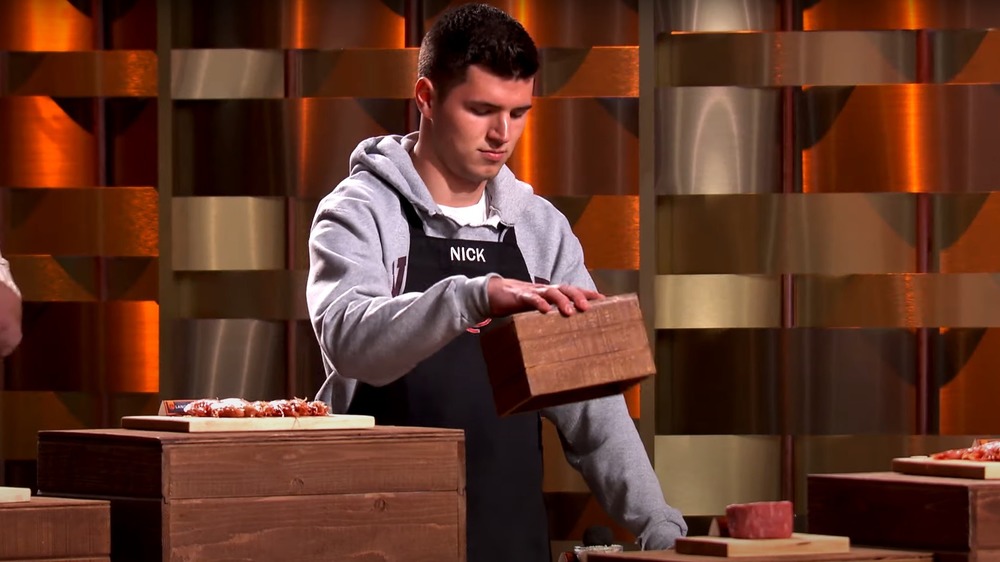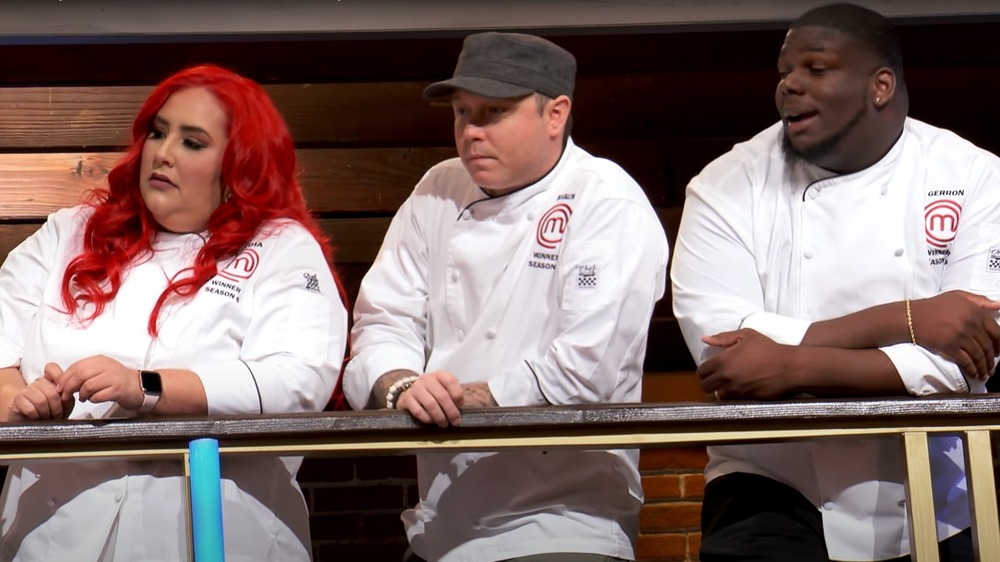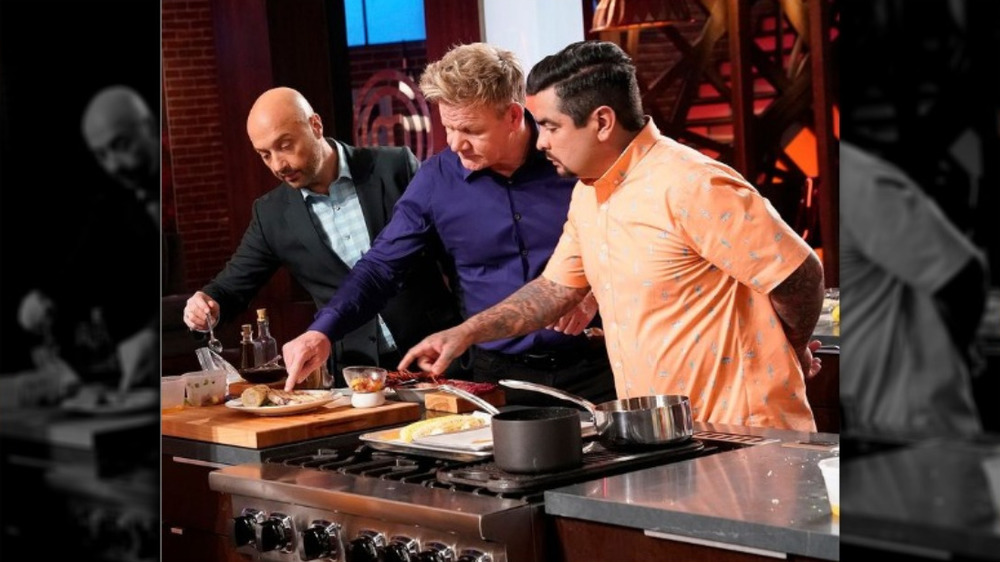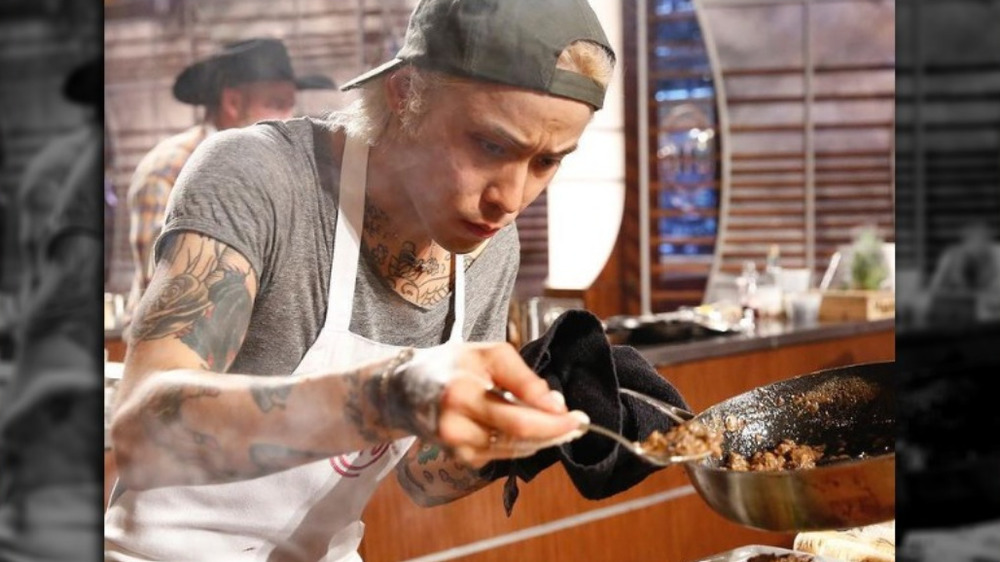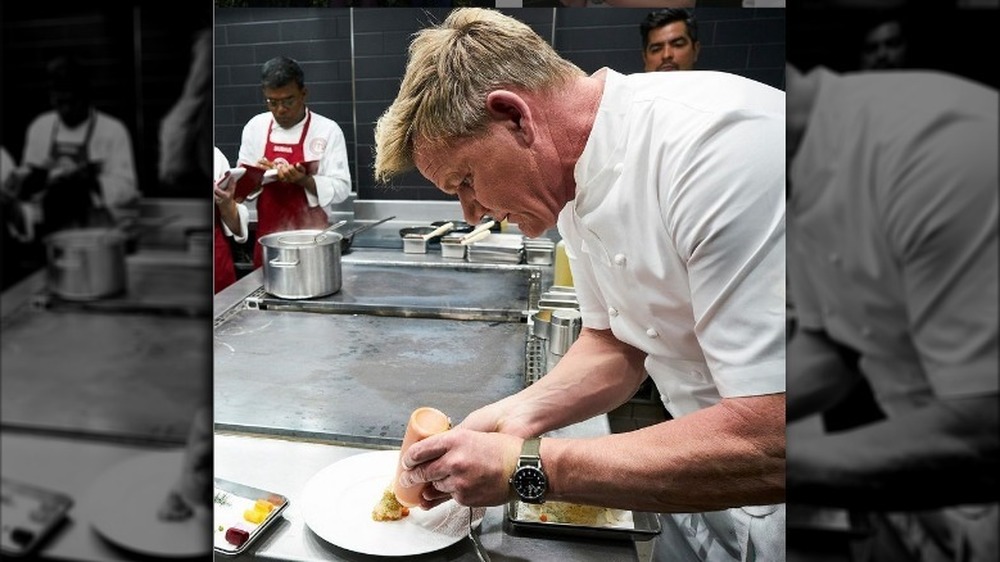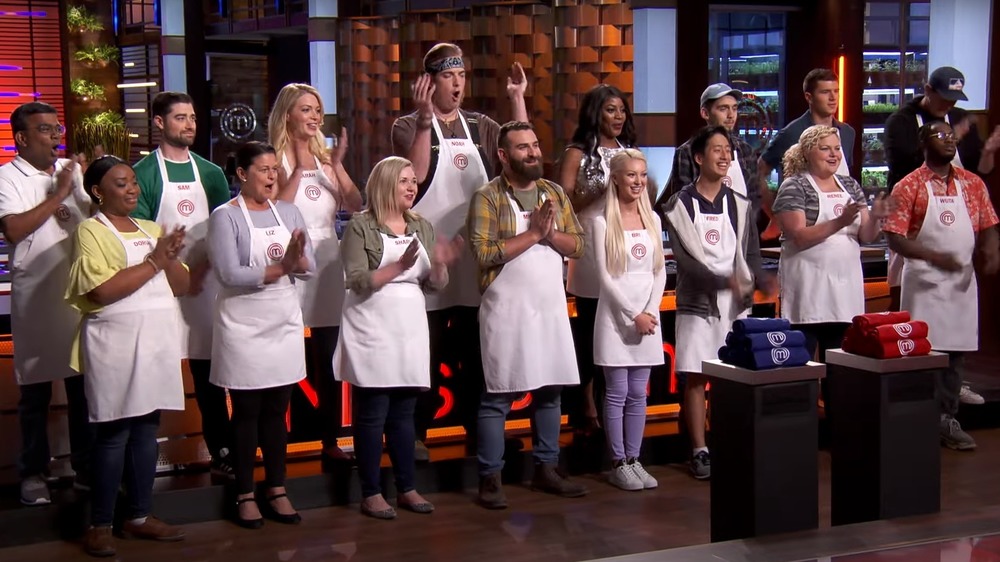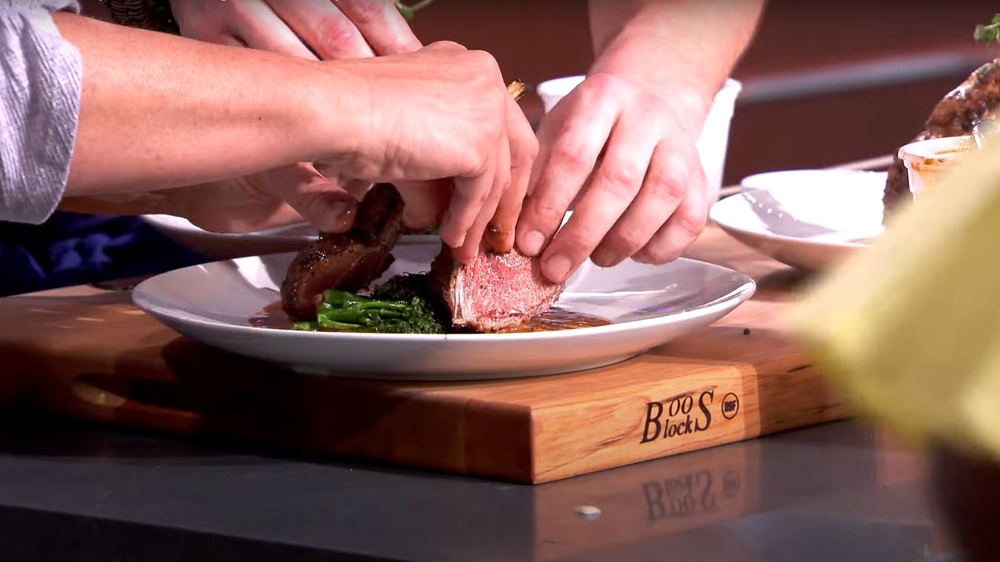What The Cameras Don't Show You On MasterChef
MasterChef is a beast in the cooking show world. It's been on in the United States for 10 seasons, with an 11th season on the way. Hosted by chef Gordon Ramsay, who's accompanied by a rotating cast of judges that include Joe Bastianich, Christina Tosi, and Aarón Sánchez, the show is quite possibly the largest and most popular cooking show of its kind. Viewers keep coming back for the high-intensity competition, fast-paced cooking challenges, and Gordon Ramsay's signature cutting judgments.
Yet, what happens on screen is only a small fraction of what goes on during the filming of MasterChef. Most of the contestants are bound by a non-disclosure contract, making it practically impossible to talk about what goes on behind the scenes.
However, several former judges and contestants have come forward after their contracts have ended and have written or given interviews about what really goes on at the MasterChef set. And it can be a doozy. The competition itself is incredibly stressful, but that's only a small part of the long days of filming, seclusion from the outside world, and complete immersion in cooking. If you've been curious what it's really like to be a contestant on MasterChef, here's what the cameras don't show you. As it turns out, even a long-running show like MasterChef can have quite a few surprises for viewers if they ever visit the set.
Some of the final MasterChef mayhem is staged
The countdown on MasterChef is very real and very enforced. When the clock stops ticking, there's absolutely no more cooking. But the camera keeps rolling long after the clock stops ticking. Especially earlier in a season with many contestants, it takes time to record everything going on. Getting just the right shot can also take a few different attempts.
When the clock stops, the cooks step back from their dishes. Then they're asked to recreate the intensity of the final minutes of the competition to make sure the cameras catch the excitement from every angle. While the contestants aren't allowed to actually make any changes to their dishes, they recreate the final scramble by moving around their dishes and moving things around the countertops.
Alice Zaslavsky from MasterChef Australia season Four writes that "[W]e would finish cooking and then have to step away from the bench, put all of our utensils down, stop touching the dish and then the next two to three minutes, just pretend to fuss around our plates." Needless to say, there's probably still plenty of temptation. "I remembered I'd forgotten to season my peas and the salt was so close to my hand but I knew there were five cameras on me so I couldn't do anything!" says Zaslavsky. The temptation may be strong, but apparently, the watchful standards and practices folks wandering around the set as described by judge Christina Tosi are stronger (via Lucky Peach).
The food presented for MasterChef judges is cold
On the television screen, it seems like all of the action on MasterChef moves shockingly fast. Contestants furiously cook their dishes then rush to get the food on plates. Moments later, the judges are tasting each dish and declaring who gets immunity and who has to cook even harder to stay afloat. In TV time, it all happens in the space of less than an hour, although we know the first challenge is usually at least 60 minutes long. In real life, however, it takes a lot longer for those final dishes to make it to the final judging scene.
"The judges would walk around and taste the food as soon as the challenge was over, while everything was still hot. If you were smart, you'd make a second plate of everything, so they get a complete sense of what you've cooked," writes Alice Zaslavsky of MasterChef Australia, season Four. "Once you finish cooking, they take your plate away and shoot it with an overhead camera so it looks fresh. Then all of the dishes go straight into the fridge, while the cast and crew would break for lunch."
Once everyone returns from their break, the dishes are simply pulled from the fridge. That's what is used to film the final judging scenes, meaning that the judges need to pretend to enjoy cold leftovers. Perhaps that's what gives Ramsay the push to be extra mean to food he doesn't like.
MasterChef hopefuls have to pass a psychological test
Just watching MasterChef can be stressful. You're on the edge of your seat, screaming or crying at the screen with every shocking twist. How could you burn the endives with only two minutes left? But of course, the stress the contestants face is infinitely more difficult and perhaps even amplified on purpose for better television drama. To make sure contestants can handle the figurative heat, each potential cook is put through both a psychological evaluation and a background check before they appear on set.
At Salon, Jessie Glenn of MasterChef season 3 writes that "[Y]ou all complete a two-hour-long personality psych test reminiscent of the somewhat outdated Minnesota Multiphasic Personality Inventory (MMPI). The test is analyzed by a computer while you wait and the results are then given to a psychiatrist who meets with each potential contestant." She goes on to mention, "You do not get to see the results. It seemed to me that the point of the test is to judge what dramatic traits each person has that could be harvested later for a plot twist."
As if that weren't scary enough, Glenn goes on to describe her interaction with the private detective in charge of running her background check. The detective asked some pretty intensive questions, digging into everything from her finances, to her resume, to her legal history. While it may make sense from a production standpoint, contestants are likely surprised to be so wholly investigated.
MasterChef contestants aren't using any recipes
Can you imagine just walking into your kitchen and creating an incredible meal entirely from scratch with no recipes or references to help guide and inspire you? Now, imagine doing that with the clock ticking and Gordon Ramsay ready to judge the final product, perhaps with one of his now notorious insults.
Sure, some people are up to the challenge, but let's be honest. The vast majority of us are not ready to have Ramsay yell at us for burning the risotto, even if we have a step-by-step set of instructions right in front of us. Few would dare to go into such a challenge without even those guidelines. But for MasterChef contestants, that's exactly what happens. With no recipes allowed in the kitchen, contestants must lean on tried and true techniques, guidance from the chefs when they offer it, and a heavy dose of luck.
"It's scary. There are moments when you're like, 'Oh my god, it worked!' I don't know any other way to explain it other than that it is amazing what the human brain can remember when you're under pressure," season 5 MasterChef contestant Elise Mayfield told AV Club. So how do they do it? It turns out that studying for MasterChef is a lot like studying for grad school. "I basically put myself through a mini culinary boot camp where I made flash cards and memorized recipes. I quizzed myself all the time," says Mayfield.
Each MasterChef contestant has their look chosen for them
Have you ever noticed how each contestant seems to have an endless selection of one particular kind of clothing in their closet? Like all camouflage shirts for the guy who hunts, for instance, or all lace dresses and cowboy boots for the girl next door? Naturally enough, these contestants don't have magically coordinating outfits or a closet full of the same shirt. MasterChef's costume department gives them a wardrobe that fits their personality type, then told what to wear for each episode. The MasterChef wardrobe and makeup crew are trying to build a particular character, after all. And it's usually done so well that you hardly even notice.
Season 5 contestant Elise Mayfield told AV Club that "You are in your outfit that you've been told to put on, you are going to wardrobe and hair and makeup." You might even notice small wardrobe changes throughout the course of an episode if you watch closely. Often cooks wear durable and comfortable shoes while cooking and change into nicer shoes and high heels that match their wardrobe when it's time for the big judging scenes. After all, MasterChef hopefuls may be working up a sweat in the kitchen, but television demands that they've got to look good while doing it.
Officials enforce rules on the MasterChef set
If you've ever been on the set of a television show, whether it purports to depict reality or is a scripted show, you'll know that what's going on in front of the camera is just the tip of the iceberg. Behind the camera, there's a small army of people making it all happen, from camera operators, to makeup artists, to the people setting up craft services.
Even from the comfort of your own couch, you can surely see that the MasterChef set is massive and complicated. It houses a working kitchen built for 24 cooks to work at once, including a viewing balcony, a small grocery, and a full dining room. What you don't see is the rest of the stage and people working behind the camera.
How is it possible for three judges to keep track of everything that's going on in the whirlwind of all of that chaos? Well, they have help. Chef and judge Christina Tosi gave up a little insight into how it all actually works. "There is a team of standards-and-practices officials who watch the contestants' every move. Everyone has the exact same advantages, and we want them to leverage those advantages fairly," said Tosi in an interview with Lucky Peach. So you can rest assured that no one is sneaking in a little extra cook time. Furthermore, Tosi says that everyone gets the same amount of help from the judges. "We want everyone to succeed," she says.
Everything MasterChef contestants do and say is recorded
In such a large kitchen, you might not even be able to hear what the person next to you is saying, much less the conversation between watching judges. Between the pots and pans getting thrown around the stovetops, stand mixers whirring, and trays coming in and out of the oven, the noise of the kitchen can be frankly overwhelming. Even with all of that going on, every single word the contestants say is recorded (via Delish). Small microphones worn by each cook can pick up even the quietest whispered conversations while cameras are recording the action from every angle.
With so much audio and video to go through, the production crew has a massive amount of material to manage for every episode. The microphones are attached to the cooks' aprons and capture conversations between contestants, people talking to themselves while they cook, and hopefully even a few dramatic sound bites to make an episode especially exciting. Still, it's got to feel a bit like George Orwell's Big Brother is watching for the contestants themselves.
MasterChef contestants are taught what to cook before the competition
It's a pressure cooker round and three contestants in season 8 are making a chocolate soufflé to secure their spot on the show. Chocolate soufflés are notoriously finicky and delicate, allowing very little room for error. How then did all three contestants — one of whom swore he knew nothing about pastry — manage to bake absolutely perfect soufflés and avoid getting sent home?
"The answer is: they teach us," writes Elizabeth Cauvel, a contestant on MasterChef season 5. "Every weekend, we'd practice three to four dishes or techniques. We learned how to perfectly cook a steak, frost a layer cake, assemble a croquembouche, and fry tempura-battered shrimp. I figured it was the closest to culinary school I'd ever get, so I threw myself into every lesson."
Cauvel explains that while filming took place Monday through Friday, the contestants were offered cooking classes on the weekend. They weren't obligated to take these classes but, considering that the lessons would walk cooks through techniques directly related to upcoming challenges, it was probably tough to turn them down. Contestants that took the classes seriously often did better on the show than ones who didn't. So ultimately it's okay if someone doesn't know how to cook everything. It's more about who remembers how to make and execute the recipe best.
MasterChef hopefuls are cut off from the outside world
It's difficult for many of us to go without social media for a whole day, much less even longer stretches without our entire phones. But if you're interested in being a reality TV star, you'll need to learn to go without. It's no surprise, once you think about it. Contestants aren't allowed to spill the beans about who made the cut or what they cooked before the show airs, of course. This means that the veil of secrecy begins from the moment the contestants step on set. Production staff takes each cook's phone before they come on set and hold on to them for the duration of filming. When not filming, the contestants are allowed contact with their family but aren't allowed to discuss any details of the filming, or broadcast where they are on social media.
Being so secluded in such a stressful environment certainly takes its toll on plenty of the cast members, especially once they re-enter society after their time on the set. After leaving the set, "the real world just came flooding back to me," season 5 contestant Elise Mayfield told AV Club. "And it was really scary because I'd been isolated for so many weeks, and getting my phone back and realizing I had a thousand emails to read was shocking,"
No food goes to waste when the cameras stop rolling
Given the amount of food that everyone goes through making their signature dishes, you may be wondering where all of it ends up. Surely Gordon Ramsay and his fellow judges don't eat the entirety of every single dish that's presented to them. And what about the food that the cooks didn't use? Surely, it doesn't go into the trash, right? Have no fear, it's not all going to waste. Any of the cooked food that doesn't make the cut for judging and filming gets eaten by the cast and crew.
After all, why go out for lunch when you've got an expertly crafted meal right there waiting for you? "The cooked food is devoured by the filming crew. A lot of them carry their own cutlery!" says Gregg Wallace, MasterChef host (via The Sun).
As for all of the groceries that aren't used? Wallace says that "the raw food gets divided up by the youngsters in the crew — talented young people who've just begun their careers and aren't necessarily earning very much." Waste not, want not, thankfully. Some crew members may even be going home to create their own inspired MasterChef dishes.
